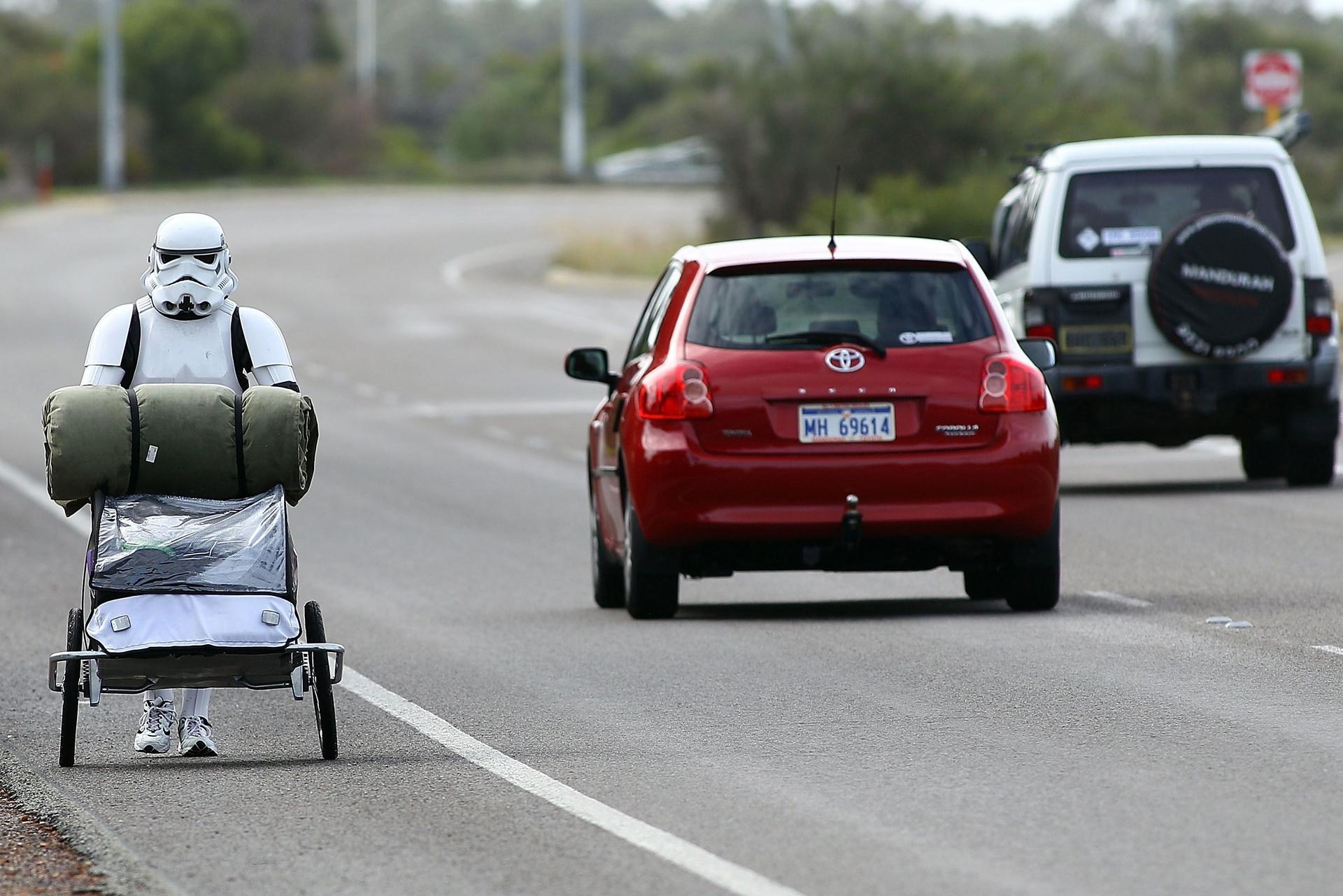Aussie millionaire vows to name and shame Australia’s stingiest rich folk
Jacob French, an Australian walking over 4,000 kilometers from Perth to Sydney for charity dressed as a stormtrooper, is pictured July 15, 2011, outside of Perth. His cause is the Starlight Foundation, an organization that aims to brighten the lives of sick children.
Australian entrepreneur Dick Smith has threatened to name and shame rich people who do not contribute to the community, saying if they don't want to open their wallets they can "rack off." (That's Aussie for… you get the idea.)
Fairfax media quotes Smith as saying the rich in the U.S. donate generally 15 percent of their income, while Australia's wealthy give less than 1 percent.
Rich people in America who don't become philanthropists become social pariahs, the 67-year-old former retail electronics magnate says. He for one is so fed up with selfish people in Australia that he is prepared to name and shame those who aren't giving back to their community.
Smith — recipient of the so-called Australian of the Year award — said he and his wife Pip had donated at least $1 million this year.
''I am absolutely disgusted that most of the wealthy are so utterly selfish and I can't work out how everyone let's them get away with it,'' Smith — who last Christmas labeled chief executives of Australia's big four banks greedy — reportedly said.
''I'm going to 'out' these people. If they don't donate, they're going to be embarrassed,'' he told the Sydney Morning Herald.
It's already been an embarrassing week for Australia's rich folk, particularly those profiting … and profiting … from Australia's resources boom.
First came a report that the mining industry had persuaded Australians that it's far more important to the economy than it actually is, and in fact contributed far less to the Australian economy than it claimed
(Down Under blog: Australia's economy owes all to its mining boom: fact or fiction?)
Australia's richest person, billionaire Gina Rinehart, meantime, is being sued by one of her twin daughters over what appears to be — you guessed it — money, Agence France Presse reports.
Rinehart, the only daughter of the late mining magnate Lang Hancock who inherited her father's business, Hancock Prospecting, 20 years ago, is now estimated to be worth $10 billion (US $10.6 billion).
Meanwhile, ordinary folk in this "lucky country" are facing cripplingly high — and growing — living costs (the flip side of the mining boom being overinflation).
Household electricity costs in Australia are forecast to rise over the next five years, leaving tens of thousands of households unable to pay their bills, according to a separate report Saturday in the Herald.
The average household power bill could rise to $2,400 a year. AGL, one of the state's largest energy suppliers, blamed a ''boomerang paradox," in which "rising wealth feeding through to rising household floor space and appliance use" is causing surges in peak demand for electricity. In other words, it's the average Australian's fault.
Back to their would-be champion, Smith, who told the SMH that while more than 2,000 people declared more than $1 million a year in income, none had claimed tax deductions for charitable giving.
In response to his criticism of "greedy" bank executives, Smith said, one ''hinted that he gave money away but he does it secretly. I just don't believe him. I've been to the big charities and said, 'Do you ever get any substantial amounts of money anonymously?' and they said 'Never'.''
In any case, philanthropy ''can't be done secretly because it's an obligation,'' Smith said.
''We've got to get it so it is an obligation if you're wealthy to become a philanthropist. Otherwise we don't want you in this country — rack off.''
Every day, reporters and producers at The World are hard at work bringing you human-centered news from across the globe. But we can’t do it without you. We need your support to ensure we can continue this work for another year.
Make a gift today, and you’ll help us unlock a matching gift of $67,000!
